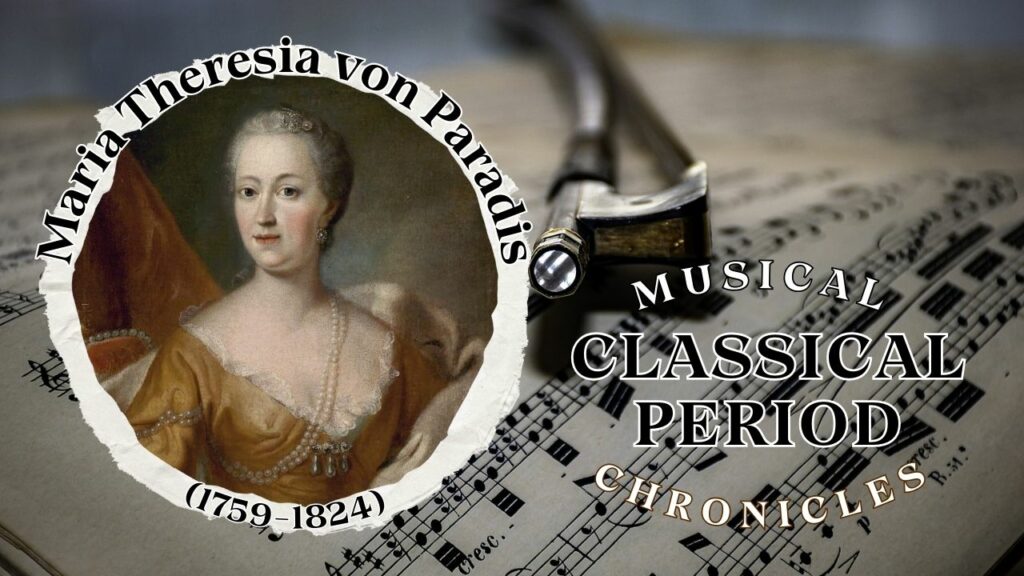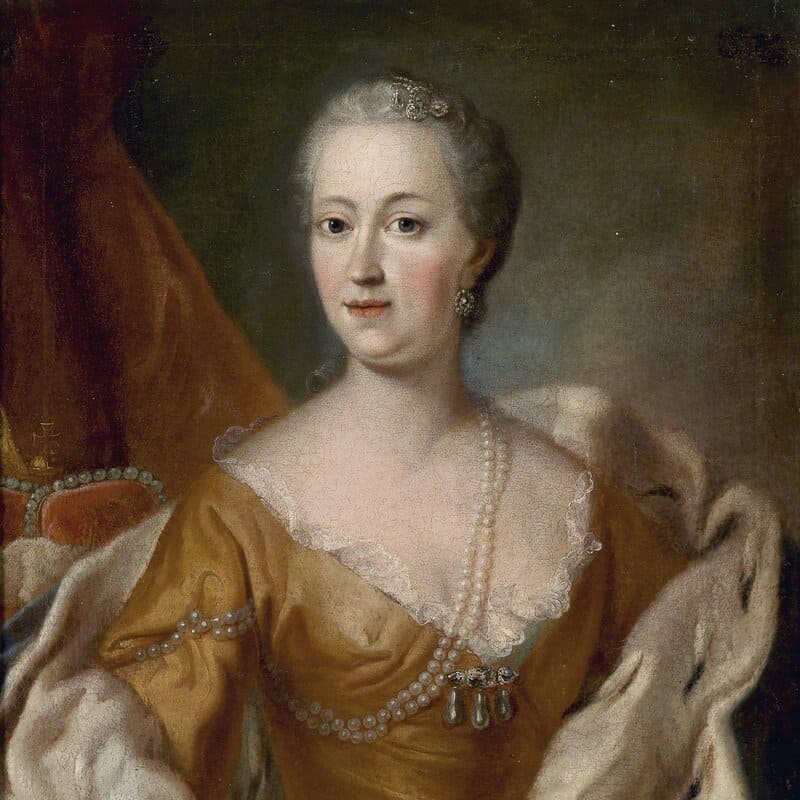
Maria Theresia von Paradis (1759-1824)
Maria Theresia von Paradis: A Symphony of Resilience
In the vibrant tapestry of 18th-century Vienna, where grandeur and artistic brilliance intertwined, Maria Theresia von Paradis emerged as a luminary, her story illuminated by the rich melodies echoing through opulent halls. Born into a world of aristocratic splendor in 1759, young Maria Theresia faced a profound twist of fate — a world where the brilliance of her mind collided with the shadows of eternal darkness.
Maria Theresia von Paradis, destined to navigate life without the gift of sight, found solace in the embrace of music. Vienna, a city resonating with the symphonies of Mozart and the poetic elegance of Haydn, became both the canvas and the audience for her silent struggles and triumphant compositions.
This inability to see clearly, the poignant prelude to Paradis’s symphony, invites us to immerse ourselves in the enigmatic world she inhabited. As the daughter of the Imperial Secretary to Empress Maria Theresa, her early years were bathed in the golden glow of privilege. Yet, within the splendid halls of her aristocratic home, a profound absence of light cast its shadows.
Blindness, an unwelcome companion from her infancy, did not dim the radiance of her spirit or the intensity of her musical pursuits. It was within the confines of the resplendent tapestry of her familial home that Paradis discovered the piano — her gateway to an unseen world of expression. As her fingers danced across the keys, a transcendent harmony emerged, weaving a narrative that transcended the limitations imposed by her lack of sight.
And thus the paradox — a blind artist who painted with sound, a composer whose creations resonated in the silent chambers of her soul. The audience is beckoned into an exploration of Paradis’s extraordinary life, where the absence of one sense heightened the others, and where music became not just a passion but a profound necessity.
As we progress, we will venture into the very fabric of Paradis’s existence, unraveling the threads of her artistry, the challenges she faced, and the indomitable spirit that fueled her symphony of resilience. Join us as we navigate through the symphonic corridors of Maria Theresia von Paradis’s life, where every note is a testament to the enduring power of music to illuminate the darkest recesses of the human experience.
Harmony in Darkness: Maria Theresia von Paradis’s Early Symphony

In the grandeur of 18th-century Vienna, where the rhythmic cadence of societal expectations was echoed by the beats of classical masterpieces, Maria Theresia von Paradis embarked on her musical odyssey. Born on May 15, 1759, into the opulent world of the Austrian aristocracy, she was the daughter of Joseph Anton von Paradis, the Imperial Secretary to Empress Maria Theresa.
Maria Theresia entered a world where societal norms dictated a life predetermined by birth and status. However, fate, in its enigmatic ways, had a unique composition in store for her. At the tender age of two, she lost her sight to a mysterious illness. In a time when the visually impaired faced myriad challenges, young Maria Theresia’s journey was set against the backdrop of both privilege and adversity.
Growing up engulfed by the splendors of the Habsburg court, she was immersed in an environment where intellectual pursuits and artistic endeavors were highly valued. Her father, recognizing the innate musical talent of his daughter, ensured that she received an exceptional education. Maria Theresia began her formal music training under the tutelage of keyboard virtuoso and composer Carl Friberth, who introduced her to the harpsichord and piano.
The intricate notes of her early compositions hinted at the depth of her musical understanding. By the age of seven, she was captivating audiences with her performances, drawing admiration for the emotive quality and technical finesse of her playing. Despite her visual impairment, Maria Theresia developed an extraordinary ability to memorize complex musical scores, a testament to her exceptional auditory acuity and innate musical intuition.
Her breakthrough on the Viennese musical scene came in 1768 when, at the age of nine, she performed at the court of Joseph II, Holy Roman Emperor. This marked the beginning of her ascent in Vienna’s musical circles, capturing the attention of the city’s elite and establishing her reputation as a prodigious talent.
Maria Theresia von Paradis’s early years were not without challenges. Navigating a world designed for the sighted, she confronted skepticism and prejudice. Yet, her unwavering determination and the unwavering support of her family propelled her forward. As she honed her skills, the young composer’s works began to gain recognition not just in Vienna but also across Europe.
The burgeoning musician’s repertoire included compositions for piano, voice, and chamber music, showcasing a versatility that transcended her visual limitations. In 1783, she premiered her opera “Rinaldo und Alcina” at the Royal Imperial Theatre in Vienna, a significant achievement that highlighted her prowess as a composer.
Maria Theresia von Paradis’s early years unfolded like a sonata, each movement marked by resilience, creativity, and a relentless pursuit of musical excellence. In the next movement of our narrative, we delve deeper into the intricacies of her artistry, exploring the challenges she faced and the symphonic legacy she crafted against the backdrop of 18th-century Vienna. Join us as we unravel the composition of Maria Theresia von Paradis’s extraordinary life, where darkness gave birth to a luminous symphony of resilience and triumph.
Breaking the Silence: A Commentary on Women’s Struggles in the 18th Century
We interrupt this program for a crucial commentary on the struggles faced by women in the 18th century.
At a time when societal norms cast a shadow on the aspirations of many, we immerse ourselves in the harmonies of Maria Theresia von Paradis’s musical journey, in order to cast a light on the broader narrative of women during this era.
In a society where the symphony of life was predominantly composed by men, women found themselves confined to predetermined roles, often restricted by societal expectations and patriarchal structures. The 18th century, though marked by cultural and intellectual flourishing, harbored a discordant note when it came to the recognition of women’s agency and contributions.
While Maria Theresia von Paradis defied societal conventions with her exceptional musical talent, her narrative serves as an exception rather than the rule. For many women, the barriers were insurmountable. Limited access to education, professional opportunities, and artistic platforms constrained the potential symphonies that countless talented women carried within them.
The silence imposed on women during this period echoes through the corridors of history. Their voices, aspirations, and creative expressions often went unheard, drowned out by the dominating crescendo of the male-centric narrative. The limitations imposed on women’s education and their exclusion from formal artistic training hindered the flourishing of talents that could have enriched the cultural tapestry of the time.
As we reflect on Maria Theresia von Paradis’s exceptional journey, let us remember that her story is an anomaly, a testament to her extraordinary resilience and the support she received from her enlightened family. For countless other women, the constraints were stifling, relegating their potential to the shadows.
This commentary is not just a reflection on the past but a call to appreciate the strides made in recognizing and empowering women in the realm of arts and beyond. Maria Theresia von Paradis, through her music and determination, serves as an inspiration, urging us to continue breaking the silence and allowing the diverse melodies of women’s stories to be heard.”
Now back to the show, where we continue unraveling the symphony of Maria Theresia von Paradis’s life, exploring the complexities and triumphs of a remarkable woman in 18th-century Vienna.
Melodies of Fortitude: Maria Theresia von Paradis’s Journey Unfolds
In the musical tapestry of 18th-century Vienna, Maria Theresia von Paradis emerged as a beacon of resilience, challenging societal norms through her extraordinary musical gift. Born into a society where gender roles were stringent, Maria Theresia faced not only the challenges of her blindness but also the broader constraints imposed on women of her time.
Inside the opulent halls of Vienna, Maria Theresia’s prodigious musical talents resonated. Her family, recognizing her innate abilities, ensured she received a comprehensive education in music, defying the limitations typically imposed on women. The Paradis household became a nurturing environment, where Maria Theresia’s blindness became inconsequential in the face of her remarkable ability to perceive and express the language of music.
As we delve into her early years, the harmonies of her compositions intertwine with the challenges she encountered. Vienna, a city brimming with artistic fervor, presented both opportunities and obstacles. Despite the flourishing cultural scene, gender biases persisted, with women often confined to the domestic sphere. Maria Theresia’s pursuit of musical excellence stood as a testament to her fortitude, a defiance of the societal norms that sought to restrain her ambitions.
Her initial forays into the Viennese musical scene marked a significant departure from convention. The scarcity of opportunities for women in formal music education did not dissuade her. Instead, Maria Theresia navigated the intricate passages of Vienna’s artistic landscape, captivating audiences and leaving an indelible mark on the city’s cultural history.
The court of Emperor Joseph II became a crucial stage for Maria Theresia von Paradis’s musical journey. Here, she faced both admiration for her talents and skepticism due to her gender and visual impairment. Her compositions, characterized by expressive nuances and innovative structures, found a receptive audience, transcending the physical and societal barriers that sought to confine her.
Vienna, with its grandeur and constraints, became the backdrop for Maria Theresia’s musical odyssey. In our exploration of her life, we uncover not just the notes of her compositions but also the resilience that harmonized with the melodies of change in 18th-century Europe.
Now, as we conclude this segment, Maria Theresia von Paradis’s indomitable spirit sets the stage for a new movement. Join us next time as we traverse the compositions and complexities of a musical genius whose journey resonates through the corridors of history.
Harmony in Darkness: The Musical Legacy of Maria Theresia von Paradis
As the final notes of Maria Theresia von Paradis’s life echo through the annals of musical history, we find ourselves standing at the precipice of the Classical era’s conclusion. Maria Theresia’s unwavering pursuit of musical excellence amid the societal constraints and her blindness leaves an enduring legacy.
Her compositions, once the source of inspiration and admiration in the salons of Vienna, continue to reverberate through the corridors of time. Maria Theresia von Paradis, though often eclipsed by her contemporaries, carved a place for herself in the grand tapestry of classical music.
In the closing bars of this episode, we witness the crescendo of her life, where the melodies of resilience and defiance harmonize into a composition of enduring strength. The Viennese air, thick with the tales of the past, carries her story forward, an ode to the indomitable spirit that defied societal norms and left an indelible mark on the Classical era.
As we bid farewell to Maria Theresia von Paradis, we prepare to step into the concluding episode of this musical chronicle. The Classical era, with its grandeur and innovations, draws its final breaths, leaving room for the next movement in the symphony of musical history. Join us in the concluding episode, where we unravel the threads that tie the Classical era together and anticipate the cadence that heralds the Romantic epoch.
Return to the Classical Period Chronicles home page.
